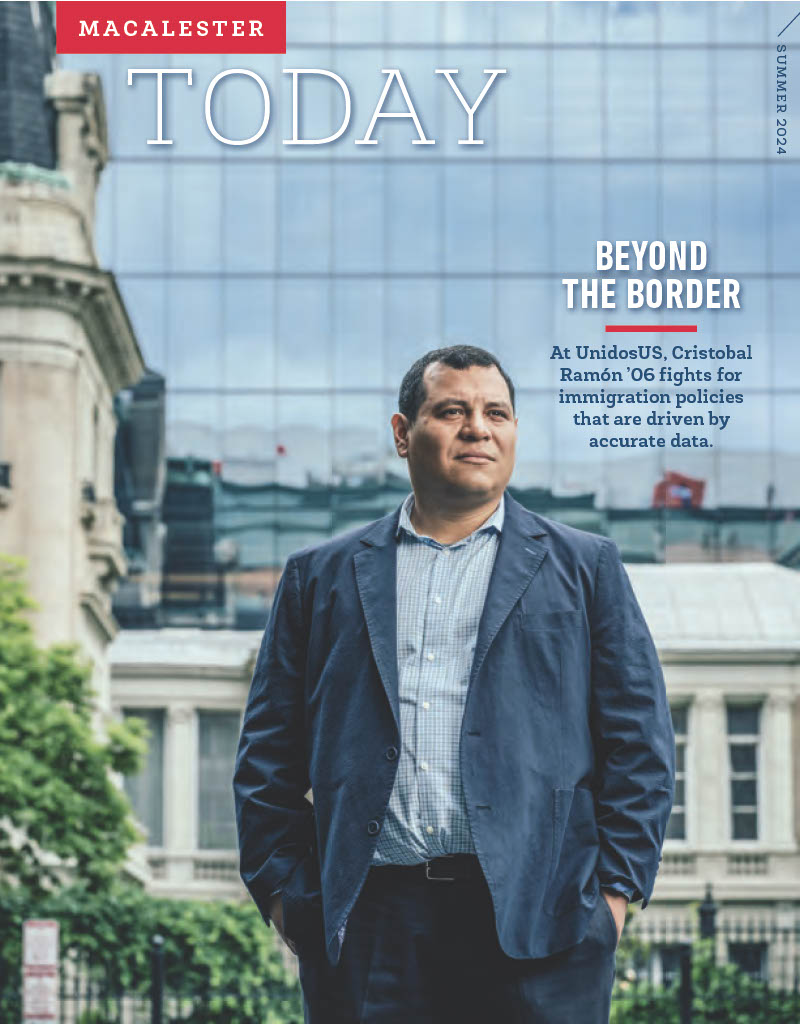
By Laura Billings Coleman / Photo by Stephen Voss
As the number of migrants crossing the border from Mexico into the US surged in 2023, so has the American public’s concerns about immigration. In a recent Gallup poll, 28 percent of respondents ranked immigration as the country’s single biggest problem, far above the government, the economy, or even inflation. The White House has sought to address this situation through a range of measures. In June, President Biden announced an executive order limiting nearly all asylum access at the US-Mexico border; a few weeks later he made a policy announcement directing the US Department of Homeland Security to make it easier for undocumented immigrants married to US citizens to apply for legal residence.
“The border is on the ballot this year,” says Cristobal Ramón ’06, senior advisor on immigration for UnidosUS, the nation’s largest Latino civil rights and advocacy organization. Whenever the topic comes up for debate, Ramón, who leads the organization’s immigration research and policy analysis, wants to make sure that lawmakers on both sides of the aisle have their facts straight.
In a new “Immigration by the Numbers” series Ramón writes for UnidosUS, his data analysis regularly debunks persistent myths. One recent post highlighted how Latino asylum seekers and refugees have a history of strengthening the US economy, and referenced Congressional Budget Office predictions that migration will add $7 trillion to the US gross domestic product in the next ten years. Another post explained that Latinos favor policies to protect asylum seekers fleeing violence, but they also share many of the concerns the broader public has about border security.
Ramón believes the country’s long-standing ambivalence about immigration is one reason that a facts-based approach is vital for better policy outcomes. “The best way to describe the United States is we’re a country of immigrants that’s wary about immigration. The individual migrant is fine, but immigration as a process can feel threatening to the established social order,” he says.
He believes that that dichotomy and political polarization contribute to our current legislative stalemate on meaningful immigration reform. “The last time we updated our legal migration system was in 1990. Just think about the labor and job market that existed then and compare it to now,” Ramón says. “Employment-based immigration literally has not changed since the dawn of the Internet. And the question you have to ask is, Why isn’t Congress doing something on this one?”
Exploring how policy decisions affect families, workers, and the wider economy has been a longtime passion for Ramón, who grew up in Pasadena, Calif., and whose parents immigrated from El Salvador. After starting his college career at Northwestern University, he transferred to Macalester to pursue a more dynamic classroom experience. The history and sociology major recalls vibrant discussions in courses taught by now-retired history professor Peter Rachleff and Sociology Department chair Erik Larson.
A year after graduation, Ramón decided to apply for a Fulbright award and found enthusiastic support from the college’s Office of Academic Affairs. “Everyone wants to feel seen, heard, and valued at college, but I saw that Macalester really cares about its students even beyond when they graduate,” he says. “And that Fulbright experience changed my life forever.” As a Fulbright Fellow, Ramón went to Universidad Carlos III de Madrid to explore how Spain, with relatively new immigration patterns, was responding to the new arrivals.
After earning a master’s degree in international relations from The George Washington University, Ramón worked hard to break into immigration policy work in Washington, DC. His lucky break came in 2017 with the Bipartisan Policy Center, studying what was then a new trend in immigration. Vulnerable families, not just single male workers, from Central America had begun finding their way to the US-Mexico border seeking asylum and economic stability. “My international relations background made me realize you can’t run away from the fact that immigration policy is foreign policy,” Ramón says. “We need to be working with other countries to manage migration, because the scope of the challenge is so large that the US can’t do this on its own.”
Ramón moved into his current position at UnidosUS in 2023. He meets regularly with interest groups, members of Congress, and White House staff to share key findings about current immigration trends and explain UnidosUS’s policy recommendations. In May, for instance, the group called on President Biden to use existing authorities to provide lawful status to long-residing undocumented individuals; it was thrilled to learn of Biden’s June 18 policy announcement directing DHS to do so. In June, UnidosUS also released a poll, which Ramón designed, examining Latino voters’ views about the border situation and their policy preferences so the border policy debate takes their views into account.
While some voters may see a duality in the White House’s recent announcements, Latino voters do not. According to the poll, they see relief to undocumented immigrants “as an integral part of how you address the challenge at the border,” says Ramón.
Meanwhile, the outcome of the 2024 election may present new policy challenges. Donald Trump’s campaign promise, if elected, to begin the “largest domestic deportation operation in American history’’ presents an unprecedented crisis for the country’s 11 million undocumented immigrants.
“The challenge is huge,” says Ramón. “Anti-immigration sentiment is nearly as old as this country—just read what Benjamin Franklin wrote about the Germans.” But he says he finds comfort in knowing how previous immigration crises have come to look in the rearview mirror. “It’s easy to burn out in this sector, and you need a lot of persistence, but one of the things I learned at Mac is I was meant to do this work, and this is the way I can make the world better.”
St. Paul writer Laura Billings Coleman is a frequent contributor to Macalester Today.
August 26 2024
Back to top





